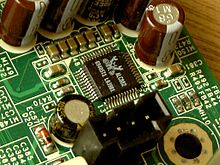High definition audio interface
High Definition Audio , also HD Audio or HDA for short , is a specification for audio chips that was announced at the IDF 2003 under the code name Azalia and presented to the public at the CES 2004 by Intel . The standard was developed by Intel together with over 80 developers of audio software and codecs as well as manufacturers of consumer electronics and was intended to replace AC'97 as its successor. Sound chips that meet this standard must be able to deliver stereo signals with 192 kHz in 32-bit quality and up to eight channels with 96 kHz each in 32-bit; this corresponds to 7.1 surround sound. Whether the computer actually outputs a usable 7.1 signal depends on the specifications of the motherboard.
Details
The standard says nothing about the other capabilities of the chip, but only defines minimum requirements for converting digital into analog signals. The specification is neither a codec (like MP3 ) nor a specific chip in the computer. For comparison: A standard CD player converts the digital information stored on a compact disc into an analog signal that is output via the headphone output or an amplifier. The information is stored on a CD at 44.1 kHz in 16-bit. If the CD player were equipped according to the new standard (as some DVD players are), it could also play higher data rates or more finely sampled music - if it is not, it remains silent because it cannot process the digital information.
support
For Windows XP with Service Pack 2, the high definition audio patch (KB888111) is required. This patch and thus support for HD audio is already integrated in Service Pack 3.
Under Linux the ALSA kernel module "snd-hda-intel" takes care of the control of the HD audio sound chips. Because of the great variety of HD audio sound chips and a mostly missing or incomplete documentation of the manufacturers about their structure, the creation of free drivers turned out to be difficult.
literature
- Thomas Görne: Sound engineering. Fachbuchverlag Leipzig in Carl Hanser Verlag, Munich et al. 2006, ISBN 3-446-40198-9 .
Web links
Individual evidence
- ↑ Peter Röbke-Doerr: CES: Intel brings high definition audio. In: Heise online . January 9, 2004 . Retrieved July 7, 2020.
- ↑ Jürgen Kuri: Intel specifies high definition audio. In: Heise online . April 16, 2004 . Retrieved July 7, 2020.
